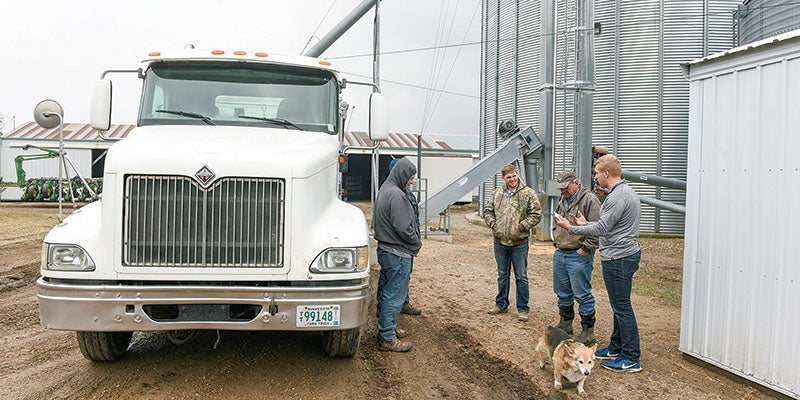PROGRESS 2021: Classroom to Combine
Published 7:01 am Saturday, February 27, 2021

- Riverland Community College ag instructor Nick Schiltz, right, talks with Riverland students along with his father Leon in 2019. Herald file photo
|
Getting your Trinity Audio player ready...
|
Riverland Community College isn’t literally putting food on tables, but it sure is teaching a lot of students how to help do so.
RCC introduced The Center for Agriculture and Food Science Technology in 2016 and the center has set a lot of young people well on their way to promising careers in agri-business.

Riverland student Tanner Boelter takes a spin on the combine simulator at Riverland Community College after it was officially unveiled to the public in 2017. Herald file photo
“Our graduates can write their own ticket,” said Dani Heiny, Director of Strategic Partnerships at RCC. “Everybody needs food and it’s a critical need. It’s one of the foundational needs. There are also amazingly great jobs in agriculture and right now there is a huge gap between the number of qualified individuals and jobs. There’s this huge shortage of workers.”
RCC is filling that worker gap after bringing agriculture back to the curriculum. Agriculture was taught at the Austin Vocational Institute up until the 1970s, but the program went on hiatus after the farming crisis hit in the 1980s.
The CAFST offers the Ag Science and Soil laboratory, a combine simulator, and on-site learning at the 160-acre Sustainable Answer Acre Farm near Lansing.
Nick Schiltz, Agricultural Instructor at Riverland Community College and also Program Coordinator to the Center for Agricultural and Food Science Technology, said that he is focused on teaching students to become employable in the Agriculture Industry while also taking care of the land.

Soil Scientist Steve Lawler helps an ag student understand soil structure at the Sustainable Answer Acre Research Farm near Lansing. Photo provided
“The projects that are conducted at the Sustainable Answer Acre farm embody important farmer industry questions and complications while providing solutions that will ensure that Minnesota and Mower County’s longevity and sustainability will last for generations to come,” Schiltz said. “All of our alumni have either transferred to a four-year school to finish their education or they have entered the world of Agribusiness. All of them have enjoyed their experience at Riverland and they were very proud to be a Riverland Ag service alumnus.”
RCC began teaching agriculture classes in 2016 after there was a push to localize agricultural education. Students who earn their degree at RCC have options of transferring to University of Wisconsin-River Falls, Southwest Minnesota State University in Marshall and South Dakota State University.
“There are many different avenues in agriculture,” Heiny said. “It’s not just going back to your family farm. It also includes food products and processing systems, biotechnology and environmental systems. It’s really been a great direction for the college because we’re right in the heart of the best agricultural land and resources in the nation and in the world.”
CAFST has received a lot of support from the Hormel Institute and the Minnesota Department of Agriculture and the enrollment of the program has increased ever since it was introduced five years ago.
“We have pursued some unique course designs to reach students along our local regions,” Schiltz said. “We’re very proud of our advances. Students, faculty and industry often collide in the same spaces and share their educational journey.”
Schiltz wants his students to learn why things work and how they work in agriculture. In the classroom, they focus on the science of how things grow and in the field, they apply the science that they’ve learned.
“We offer opportunities for students to apply what they learn in the classroom out in real world situations,” Schiltz said. “We also work closely with our industry partners, who graciously provide us with donations and different agricultural equipment items that we facilitate course content with.”
Schiltz isn’t just aiming agriculture education at RCC students. He’s also worked with a number of youth programs in the community, including a STEM summer camp for students in grades 9-12, an R-Step Academy that puts students in grades 10-12 on path to attend college. Schiltz also works with students in 4-H.
In 2019, RCC hosted its first annual Mower County Progressive Agriculture Safety Day for students in grades 3-5.
“We hope to launch a Riverland and 4-H agronomy day in the near future to excite students about opportunities for them in agriculture,” Schiltz said. “We hope to always provide meaningful programs that establish Riverland as a local leader and across Minnesota for agriculture eduction for students of all ages.”
Farm business management has also been a big part of the RCC program as 10 faculty members work with area farm families to help them develop goals and run their farms efficiently.
The program offers advice on crops, fertilizer and also budgeting. During the pandemic, it helped farmers apply for government grants to help out with payroll protection.
Agriculture provides 23 million jobs in the United States and it makes up 17 percent of the country’s work force. In total, agriculture contributes $2 billion to the economy.






